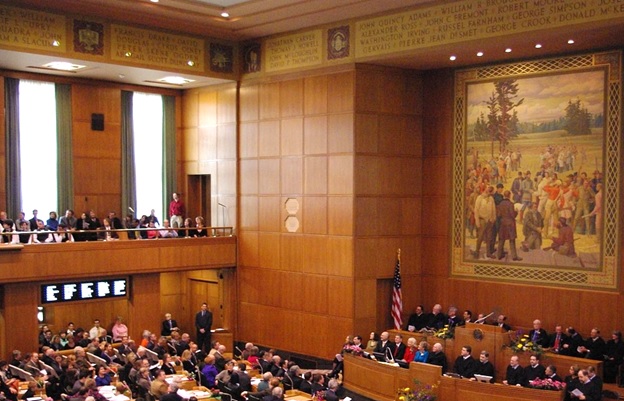Governor Brown Announces Intent to Sign SB 1528, Call for Possible Special Session – What’s Next?
April 6 was the deadline for Governor Kate Brown to announce intent to veto the bill that would disconnect Oregon’s tax code from the 2017 Federal Tax Cut and Jobs Act disconnect bill (SB 1528) on the 20% income deduction for “pass-through” businesses.
SB 1528 bars Oregon’s small businesses from claiming the 20% deduction on their state income tax, denying $180+ million per year in tax reductions to Oregon small businesses that would otherwise be due.
There was a strong push for the Governor to utilize her veto power and speculation that she might do so. But on the afternoon of April 6, the Governor announced her intent to sign the bill. She also called for a possible Special Session by June to consider a sole proprietor tax credit. SB 1528 denies tax reductions to 278,839 Oregon sole proprietors.
The Oregon Constitution permits Special Sessions to be called by the Governor under extraordinary circumstances, “by proclamation, and [she] shall state to both houses when assembled, the purpose for which they shall have been convened” (Article V, Section 12). The Constitution also permits the presiding officers of both chambers to convene a Special Session, upon written request of a majority of members of each chamber (Article IV, Section 10a). A date has not yet been set for the Special Session.
Meanwhile, the threat of a potential lawsuit may soon be realized. Senator Brian Boquist (R-Dallas), during the 2018 Legislative Session explained he would file a lawsuit if SB 1528 were enacted, reasoning that this was an opportunity for the Supreme Court to weigh in on what a “bill for raising revenue” means. Arguably, because SB 1528 generates $1 billion in revenue over five years, it is recognized as a bill for raising revenue. Article IV, Section 18 of the Oregon Constitution states “bills for raising revenue shall originate in the House of Representatives”, and Article IV, Section 25 requires a 3/5 majority of all members of each chamber to pass a bill for raising revenue. Neither of these requirements was met for SB 1528, which means that the bill may be unconstitutional. A worst-case scenario is that the Legislature would have to refund money derived from this potentially unconstitutional piece of legislation. The lawsuit is likely to surface after the bill signing takes place, sometime in the near future.
Disclaimer: Articles featured on Oregon Report are the creation, responsibility and opinion of the authoring individual or organization which is featured at the top of every article.


